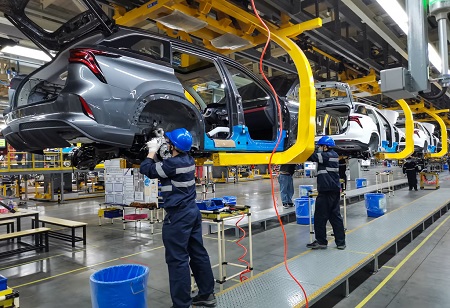
Changan Auto Launches Subsidiary in Germany to Expand European Presence

 Changan Automobile, a Chinese partner of Ford Motor and Mazda Motor, has entered the European market by establishing its first subsidiary on the continent, a marketing and service unit in Germany. As the fourth-largest state-owned automaker in mainland China, Changan announced that its German branch, Changan Automobile Deutschland, will handle marketing and engineering research to support the company's growth in Europe.
Changan Automobile, a Chinese partner of Ford Motor and Mazda Motor, has entered the European market by establishing its first subsidiary on the continent, a marketing and service unit in Germany. As the fourth-largest state-owned automaker in mainland China, Changan announced that its German branch, Changan Automobile Deutschland, will handle marketing and engineering research to support the company's growth in Europe.
“It is another step to enforcing our Vast Ocean strategy”, the carmaker said in a statement. Vast Ocean refers to Changan’s ambition to internationalize its businesses, with plans to build and sell more cars outside mainland China, where cutthroat competition has squeezed profit margins for both electric and petroleum-driven vehicles.
In April 2023, the Chongqing-based company announced plans to invest $10 billion internationally by 2030. Just four months later, it revealed an investment of 1.83 billion yuan ($257.4 million) to establish its first overseas factory in Thailand. This plant, with an annual production capacity of 100,000 units, will manufacture electric vehicles for the Thai market as well as for export to Australia, New Zealand, the UK, and South Africa.
“Europe is still attractive to Chinese carmakers because of its market size and potential high-profit margins”, said David Zhang, general secretary of the International Intelligent Vehicle Engineering Association. In August, the European Union announced that additional duties of 9 to 36.3 percent would be levied on EVs imported from China, 11 months after it launched an anti-subsidy investigation into battery-powered cars assembled on the mainland.
In August, the EU imposed an additional 21.3 percent tariff on Changan, on top of the standard 10 percent rate, due to the company's involvement in an investigation among 17 firms. According to Shanghai-based electric-car data provider CnEVPost, Changan delivered 228,000 vehicles outside mainland China in the first seven months of this year, marking a 67.6 percent increase from the previous year. This figure excludes vehicles produced through its partnerships with foreign automakers. The company targets a total of 480,000 units in overseas deliveries under its own brands for the year, more than double its sales of approximately 230,000 vehicles last year.
The US bank projected that the profitability of the entire Chinese EV industry could decline into negative territory this year if BYD were to reduce its car prices by an additional 7 percent, or 10,300 yuan. However, according to Stephen Dyer, Greater China co-leader and head of the Asia automotive practice at global consultancy AlixPartners, Chinese automakers benefit from a significant cost advantage over their global competitors due to a well-established supply chain and robust manufacturing capabilities.

